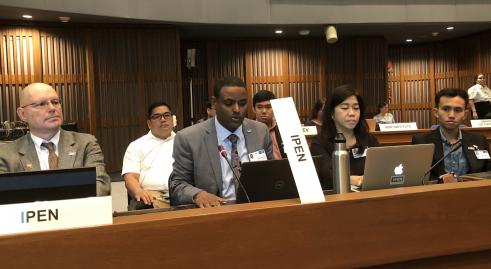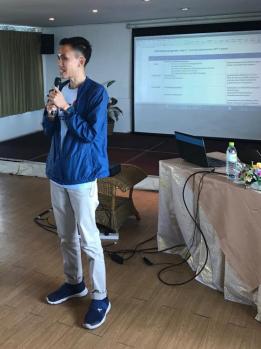1 October
"We were here in the same building in November 2003 as part of SAICM negotiations and we have been engaged in grassroots implementation since the very beginning and have as a network adopted “Toxics-free Future” as our vision for accomplishing SAICM’s goals. In adopting SAICM, governments agreed that advancing chemical safety should be viewed as a necessary component of the sustainable development agenda. Actions related to chemical safety and toxic chemicals are either referenced or implied in many, if not all, of the SDGs.
The global chemical production is projected to double by 2030, with rapid growth in emerging economies. In our view, a new global agreement on chemical safety should therefore include both an upgrade to SAICM, SAICM 2.0, and an enabling framework to match the growing challenge of health, environmental, and economic injuries associated with the production, use, and disposal of toxic chemicals and wastes."
Read the whole statement, given in plenary by IPEN Co-Chair Dr. Tadesse Amera, here.

28 September
Today IPEN held the first of its 2-day preparatory meeting for the SAICM IP3. Discussion during the meeting centered around the meeting flow, objectives, targets, indicators, milestones, and institutional arrangements, amongst other items.

23 September
Views of the SAICM 3rd Intersessional Meeting (IP3) (中文, English, русский, español, français, العربية)
IPEN's "Views of the SAICM 3rd Intersessional Meeting (IP3)” document addresses issues that will be taken up at the IP3, including process considerations; an enabling framework; targets, indicators and milestones; governance; and more.
22 September
Update on the use of highly hazardous pesticides in six African countries: Cameroon, Ethiopia, Kenya, Mozambique, Tanzania and Zambia
Highly Hazardous Pesticides (HHPs) are a threat to human health and the environment, with significant impacts on developing and transition countries. In 2015, more than 100 governments at the 4th International Conference on Chemicals Management agreed that HHPs were an issue of global concern and reached a consensus resolution to give priority to the promotion of agroecological alternatives in the process of implementing the strategy on HHPs developed by FAO-UNEP-WHO.
The phase-out of HHPs and the promotion of agroecological alternatives contribute to achievement of the Sustainable Development Goals (SDGs) that call for, inter alia, efforts to promote sustainable agriculture (SDG2), healthy lives and well-being (SDG3), sustainable management of water (SDG6), decent work (SDG8), and the sustainable use of terrestrial ecosystems and halt of biodiversity loss (SDG15). Reduction and elimination of HHPs would make a significant contribution to each of these goals by reducing exposure and adverse impacts on human health and the environment.
IPEN Participating Organizations in Cameroon, Ethiopia, Kenya, Mozambique, Tanzania and Zambia conducted surveys of pesticide registration laws and examined the country situation on HHPs and possible alternatives. This document summarizes some of the main findings from those surveys.
20 September
Thought Starter on Beyond 2020 Indicators and Milestones: Chemical Safety Contributions to the SDGs
Targets, indicators and milestones are a key component of the new Beyond 2020 chemical safety agreement because they provide an important measure of what the new agreement will accomplish. IPEN has prepared a thought starter that proposes targets, indicators and milestones that reflect tangible outcomes to reduce harms in the real world and links these results to the achievement of defined Sustainable Development Goals (SDGs).
18 September
IPEN and colleagues will be attending the upcoming Third meeting of the intersessional process considering the Strategic Approach and sound management of chemicals and waste beyond 2020 from 1 - 4 October, 2019 in Bangkok, Thailand. Please check back here soon for more information about IPEN's meeting-related publications and activities!
